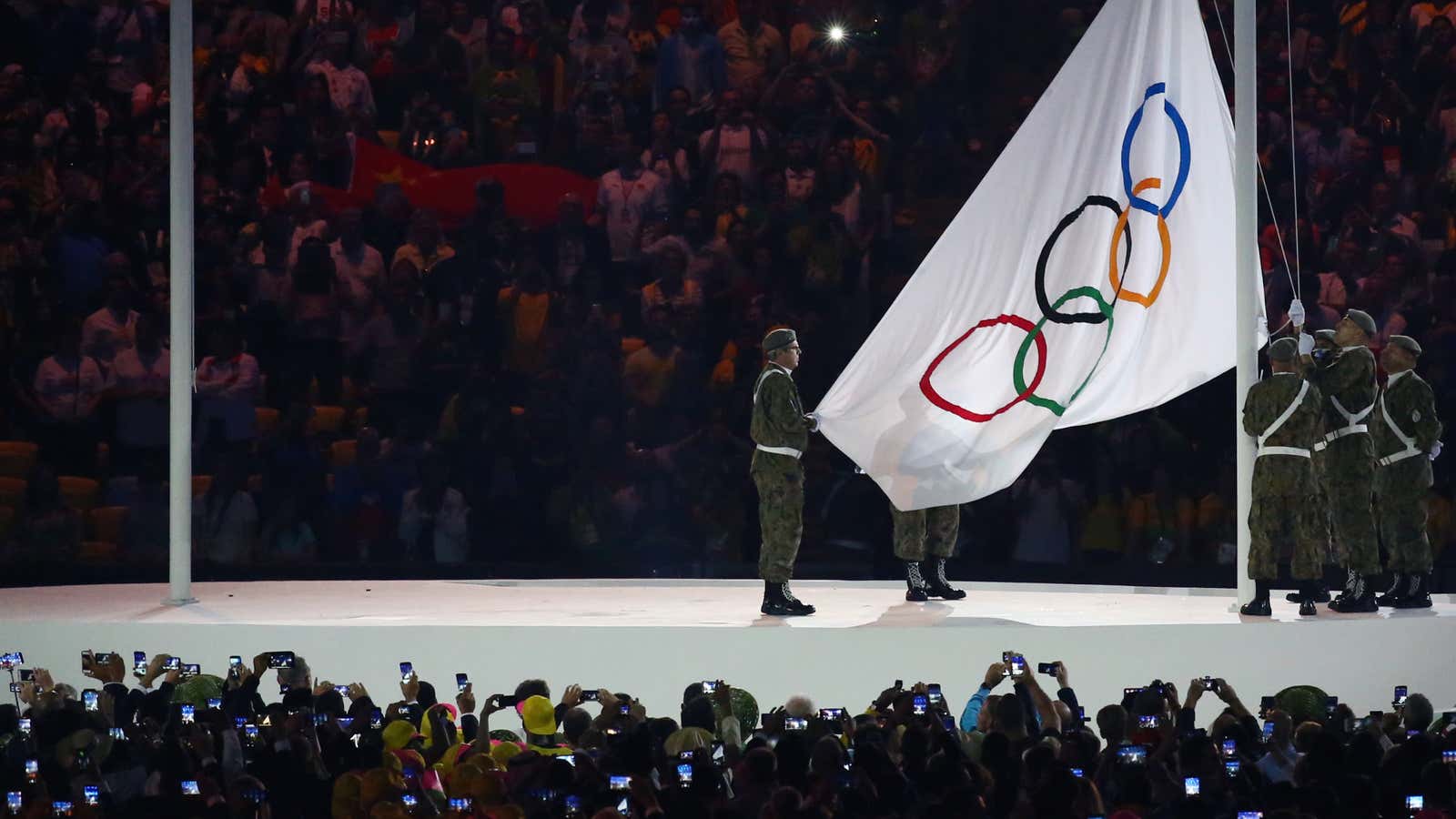The Rio 2016 Olympics kicked off last week (Aug. 5) with the pomp and circumstance we’ve come to expect from opening ceremonies. For the next two weeks, millions will watch the best athletes in the world compete for glory and national pride. And yet, when all the gold medals have been awarded and the torch has been blown out, the question on many people’s minds will doubtless be: “Was it worth the money?”
At the moment, the cost for Rio is estimated at around $4.6 billion. And that’s without factoring in another $1.6 billion in estimated budget overages. The total is still far, far lower than the cost of the 2014 Winter Olympics in Sochi, but it’s not exactly pennies for a country mired in an economic downturn. Setting Russia’s excessive and cost-ineffective Games aside, examining what happened in London in 2012 might be a better way to try to predict what Rio’s eventual balance sheet will look like.
The London example
Turns out it’s very difficult to measure the effects of a mega-event like the Olympics. The London Summer Games cost around $15 billion, including infrastructure costs. While also less than Sochi, the London Games ended up running far over budget, according to a report released by Oxford’s Said Business School.
But that still doesn’t necessarily mean the Games were bad for London’s bottom line. From a holistic standpoint, the Games were a smash. British athletes combined for a stunning 29 gold medals and 65 total—their best tally since 1908. The city was in a celebratory mood, and on the surface everything seemed to be working just as it should.
In 2013, basking in the afterglow of a successful games, the city was eager to view its project though rose-tinted glasses. A governmental survey estimated that the Olympics will end up will bringing Great Britain tens of billions of pounds by 2020. However, this figure has raised some eyebrows. “It’s almost like a bit of creative accounting. There’s no way of testing whether what they’re saying is really true,” said sports economist Stefan Szymanski to the BBC at the time.
“The construction of the Olympic Park in particular provided a major stimulus to the construction sector at a time when it had been hard hit by the recession,” the report’s authors noted. “Developments in East London such as Westfield that have been catalyzed by the Olympic Park development have generated further benefits for the local area.”
One of London’s biggest success stories has been its use of Olympic facilities. The government ensured that the Olympic Stadium, for example, would be turned into a state-of-the-art 60,000 seat soccer stadium, which will now host Premier League soccer team West Ham United. Extraordinarily, West Ham—which recently received millions as part of a Premier League TV deal—will only have to pay £20 million for the £270 million refit. British taxpayers will pick up the tab for the rest.
Back to Brazil
Despite the optimistic outlook in London, Andrew Zimbalist, a sports economist who has studied the Olympics extensively, says there just isn’t much data to support the idea that the costs of the Olympics are made up over time. More concerning, however, are the unreported costs of the games. As Zimbalist noted in an editorial for the Huffington Post, the cost for the games could end up being closer to $20 billion because of the muddled arithmetic used by city officials and Olympics organizers:
So, how do we understand what the real cost is? First, there are essentially three buckets of money that are used to host the Olympics: operations costs, including security; venue construction or renovation costs; and infrastructure costs. Many press articles refer only to the operations costs, which account for spending during the 17 days of the Games and the temporary venues. Others refer to operations plus venues, and still others refer to all three.
And Brazil, unlike London, struggled much more obviously from the start. The nation’s economic woes and infamous governmental corruption aside, its games have been plagued by bad publicity. A string of major athletes refused to come to Rio due to fears over the mosquito-borne Zika virus. Guanabara Bay, where the sailing events will take place, is full of sewage. And a potential strike by police over unpaid wages has led to security concerns.
Meanwhile, many Brazilians have been left to wonder what would have happened if those billions had been put to other uses. A national spectacle may be good for morale, but it can also create resentment.
CBS News spoke with Felipe Paiva, who lives in a Rio favela.”All this money being spent on the Olympics—is anything getting better for you or the people in the favelas?” Paiva said. ”The investment is not for us, it’s for the foreigners.”
In the face of international criticism, Rio mayor Eduardo Paes remains publicly confident, however. “I’m getting all the flak for the problems of the Olympics, I’m the one who did practically everything,” he told the Los Angeles Times, adding that Rio was never meant to be a cure for his country’s ills. “We never said we’d solve all of Rio’s or Brazil’s problems. We said the Olympics would make progress on some problems.”
For Paes’ sake—and his constituents—it had better.
